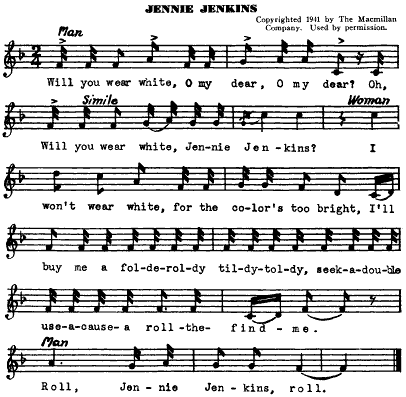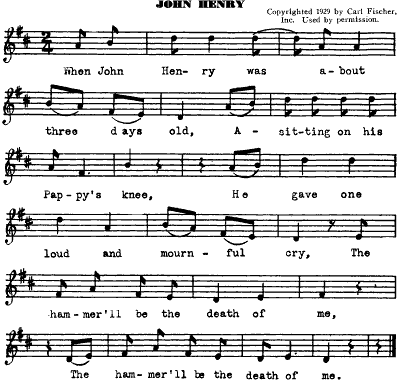American Songs for American Children #1
B. A. Botkin and Alan Lomax
Music Educators Journal, Vol. 30, No. 3 (Jan., 1944), pp. 24-25
This is the first of a series of contributions supplied for the JOURNAL by the M.E.N.C. Committee on Folk Music of the United States. Mr. Botkin, who prepared the article introductory for the Committee, is in charge of the Archive of American Folk Song, Library of Congress. Other members of the Committee: Margaret Lowry (chairman), Jacob Evanson (vice-chairman), C. Scripps Beebee. Mrs. F. R. Boggs, Roy Freeburg, Joseph A. Leeder, Mildred Lewis, Frank Luther, Sarah E. O'Malley, Mae Knight Siddell, Clara Ellen Starr, Paul Thornton, Erma Nala Voss.
The comments by Mr. Lomax and the songs are reprinted from American Songs for American Children, a pamphlet published for use at the 1942 biennial meeting of M.E.N.C. Acknowledgment is hereby made to Carl Fischer. Inc., for "John Henry" from SO 1 Folic Songs (1929) by Bascom Lamar Lunsford and Lamar Stringfield, and to The Macmillan Company for "Jennie Jenkins," taken from Our Singing Country (1941) by John A. and Alan Lomax.
Jennie Jenkins
One of the features of frontier entertainmentw as always the boy-girl dialog song. The usual theme was polite courtship and the usual feeling was light humor or delicate sentiment. The actors glowed with embarrassment and pleasure as they sang. Jennie Jenkins has been recorded in New England, the South, and the Middle West, and one can say, therefore, that it is national in its spread. The fun comes when you try to memorize the nonsense syllables and sing them as fast as you can.
-ALAN LOMAX

Will you wear red, my dear, O my dear?
Oh, will you wear red, Jennie Jenkins?
I won't wear red,
It's the color of my head, etc.
Will you wear purple, my dear, 0 my dear?
Oh, will you wear purple, Jennie Jenkins?
I won't wear purple,
It's the color of a turkle, etc.
John Henry
If a committee of folklorists were asked to choose the most important folk ballad that has yet come out of America, I think there is no question that they would decide upon the ballad of John Henry, the steel-driving man. The story runs deep into the roots of human nature. Its hero died in the heat of building the America we know and fight for today, for our democracy is based on rapid communication and on an industrial system fed by the railroads. The ballad itself, an extension of the classical British ballad form, was composed by Negroes, but now is shared equally by negro and white singers. John Henry it is believed was a tunnel worker, engaged in the biggest tunnel operation that man had yet undertaken, the building of the Big Bend Tunnel of West Virginia on the C. & O. Railroad. He was a steel driver; his hammer, along with those of scores of other tireless men, drove steel bits into the living rock of the tunnel face; the holes they made were filled with blasting powder, the charge was ignited, and the explosion gnawed the tunnel ten feet farther into the heart of the mountain. About 1870, they say, John Henry's boss brought the first steam drill out on the job and decided to find out by an actual contest whether a human or mechanical drill was the most efficient. John Henry was chosen as the champion of hand labor.
He "drove the steam drill down," as the song tells, but in the contest, "he broke his poor heart and died, Lawd, Lawdy." The ballad of John Henry is the great ballad of the industrial revolution, when machines began to displace hand labor. The legend of John Henry today walks through the dreams of the Negro people of the South with a new comrade, the Brown Bomber from Detroit, Private Joe Louis.
-A. L.

John Henry had a little woman
And her name was Polly Ann;
When John Henry was sick and lay on his bed,
Polly drove steel like a man,
Polly drove steel like a man.
The captain says to John Henry one day:
Gonna bring me a steam drill round,
Gonna take that steam drill out on the job,
Gonna whop that steel on down,
Gonna whop that steel on down.
John Henry says to the captain one day:
Lord, a man ain't nothing but a man;
But before I'd let this old steam drill beat me down
I'd die with my hammer in my hand,
I'd die with my hammer in my hand.
John Henry looked up on the mountain
And they put him in the lead to drive;
The mountain so tall and John Henry so small,
He laid down his hammer and he cried,
He laid down his hammer and he cried.
John Henry said to his shaker one day:
Shaker, why don't you sing?
For I'm swinging twelve pounds from my hips on down,
Just listen to that cold steel ring.
Just listen to that cold steel ring.
The man that invented the steam drill,
He thought he was mighty fine;
John Henry drove his fifteen feet
And the steam drill only made nine,
The steam drill only made nine.
John Henry was hammering on the mountain
And his hammer was striking fire;
He drove so hard 'til he broke his poor heart
And he laid down his hammer and he died,
He laid down his hammer and he died.
They took John Henry to the graveyard
And they rolled him in the sand,
Three men from the east and a lady from the west
Came to see that old steel-driving man,
Came to see that old steel-driving man.